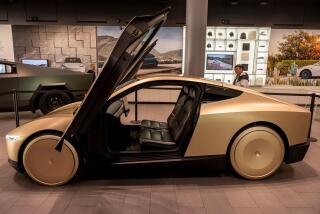Detroit to L.A. in an Electric Van : Technology: Cross-country trip may win Chrysler vehicle a place in the record book. But mass production is another matter.
- Share via
An electric minivan made by Chrysler has made its way across the country to California, where it may never be sold.
A crew of 10, trailed by a motor home and a pickup truck to carry a recharging machine, drove nine days from Detroit to a press conference Friday at the Eco Expo, an environmental products trade show at the Los Angeles Convention Center through this weekend.
Chrysler pronounced the feat a record-breaker, surpassing the current Guinness Book of World Records’ electric vehicle distance mark of 2,500 miles in 158 hours. Chrysler will claim 2,604 miles in the same time.
“This is the starting position for Chrysler bringing electric vehicles to the market,” said David Smith, Chrysler’s program manager for special projects engineering.
But triumphs can be illusory in the unsettled business of electric cars.
As the gray Chrysler TEVan rolled onto the convention floor, its engineering team in Detroit worried that it could fail a crucial test required by the California Air Resources Board, the state agency that is requiring big auto makers to sell electric cars in California by 1998.
Any electric vehicle that doesn’t meet ARB standards, the toughest in the nation, is not likely to be mass-produced.
The test, which will use the U.S. Environmental Protection Agency’s fuel economy test, will rate how far the minivan can travel between charges.
This test uses a machine that puts different energy loads on a vehicle while it runs in place, to simulate performance going up and down hills.
But tests that Chrysler has run in its lab show that its minivan could have trouble making it up some of these theoretical hills with the air-conditioning on.
Chrysler contends that the test, designed for internal-combustion engines, is unfair to electric cars because it adds the extra power load of air-conditioning to the electric motor. In an electric car, Chrysler says, the load is felt in the batteries, not the motor.
If the load is placed on the motor to account for air-conditioning, Chrysler says, it might not make it up the hill. The ARB could end the test at that point and publish unfairly low performance figures, said Chrysler senior development engineer Arthur L. Merriweather.
“The vehicle is somewhat marginal and we won’t be able to make those hills,” Merriweather said.
On the cross-country trip, the crew had to stop every 50 to 70 miles and spend up to three hours recharging the batteries.
Chrysler plans to petition ARB to amend the test.
ARB spokesman Jerry Martin said Friday that its test staff “is willing to discuss any concerns and will consider making adjustments to the procedures.”






